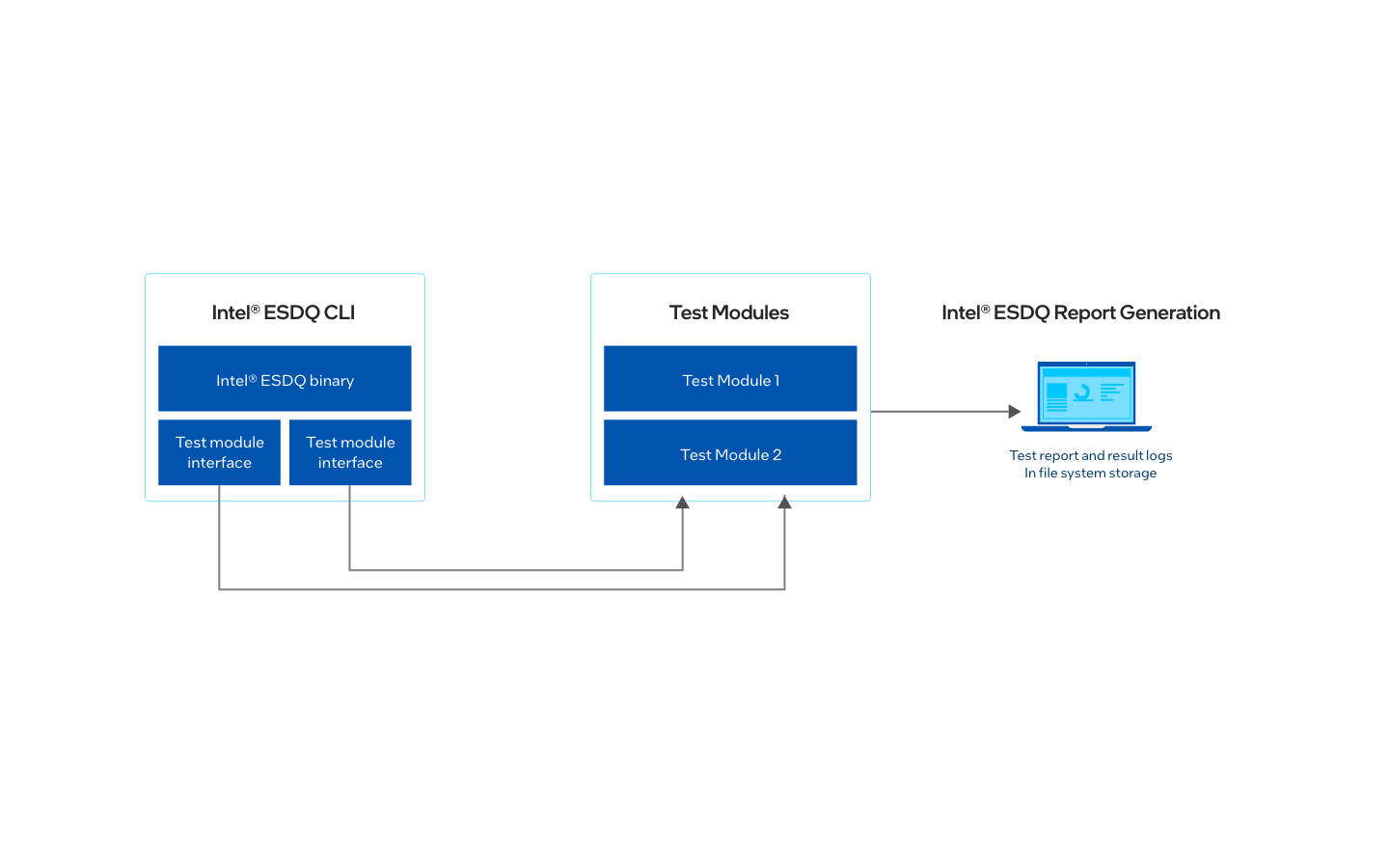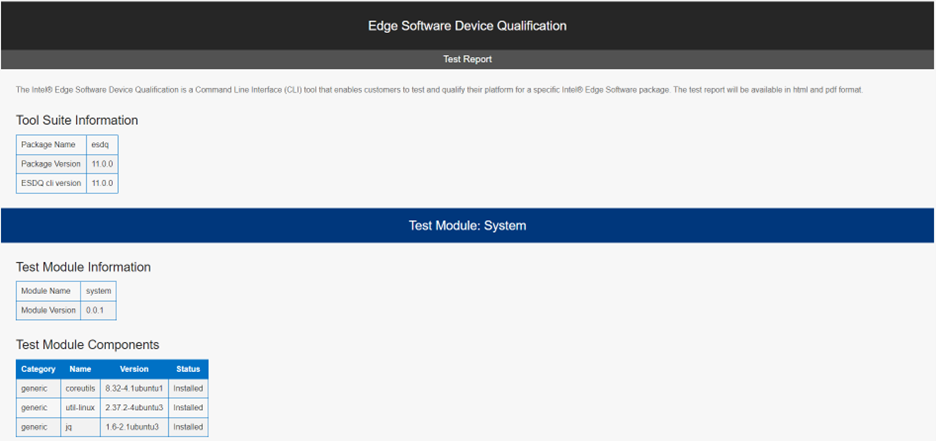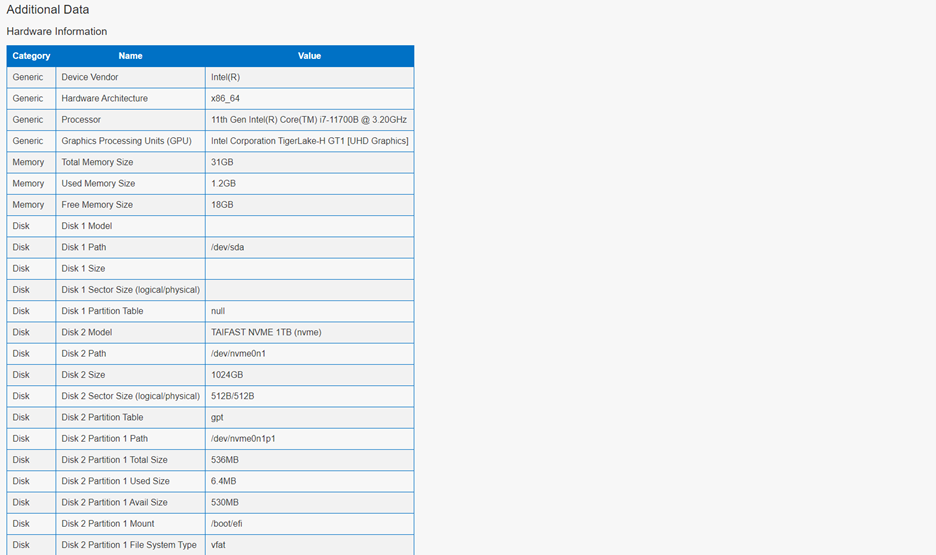Overview
The Intel® Edge Software Device Qualification (Intel® ESDQ) package comes with the Command Line Interface (CLI) tool. It provides customers with the capability to run an Intel-provided test suite at the target system, with the goal of enabling customers to test their platform for a specific Intel® Edge Software package.
Refer to the Intel® Edge Software Recommended Hardware Program Overview for more details.
The following Intel® ESDQ Test Packages are supported by Intel® ESDQ version 11.0.0 (current). For information on specific Intel® ESDQ Test Packages or to Configure & Download Intel® ESDQ Test Packages, follow the links below:
- Intel® ESDQ for AI Box for Video Analytics
- Intel® ESDQ for Robotics SDK (formerly Intel® ESDQ for Autonomous Mobile Robots)
- Intel® ESDQ for Intel® Edge Controls for Industrial
- Intel® ESDQ for Intel® Tiber Edge Platform (New)
Time to Complete: Approximately 45 mins for installation and 30 mins of execution depending on the test modules
Programming Language: Python* 3.80 package
Test Modules: Depends on the Test Modules
Target System Requirements
- At least 2 GB RAM.
- At least 32 GB hard drive.
- A stable Internet connection.
- Supported operating systems:
- Ubuntu* 22.04 LTS
- Ubuntu 20.04 LTS
How It Works
Intel® ESDQ package consists of Intel® ESDQ CLI binary and the respective test module interfaces. This package is downloaded by the Edge Software CLI onto the target system.
Intel® ESDQ CLI binary and its test module dependencies are listed in the edgesoftware-configuration.xml. Edge Software CLI will use the same mechanism to download and install the Intel® ESDQ components and test suite onto the target system along with the other package components. Once downloaded, the Intel® ESDQ CLI tool can launch various test modules corresponding to the package.
The test modules interact with the Intel® ESDQ CLI through a common test module interface layer (TMI), which is part of the Intel® ESDQ CLI binary. Intel® ESDQ generates a complete test report in HTML format and detailed logs packaged as one ZIP file, which the customer can email to the Intel® ESDQ support team.

Get Started
Intel® ESDQ CLI tool and test modules are installed as part of the Edge Software package.
NOTE:
Be aware that screenshots may show a package version number that is different from the current release. See the Release Notes for information on the current release.
Download and Install Intel® ESDQ
Select Configure & Download on the following pages to download the package:
- Intel® ESDQ for AI Box for Video Analytics
- Intel® ESDQ for Robotics SDK (formerly Intel® ESDQ for Autonomous Mobile Robots)
NOTE:
The latest Intel® ESDQ version is 11.0.0.
- After downloading the Intel® ESDQ package, perform the following on the target system:
- Create an installation directory.
- Copy the package into the installation directory.
- Extract the package.
- Go to the edge_software_device_qualification directory, and change the permission of edgesoftware.
cd edge_software_device_qualification chmod +x edgesoftware - Run the command to install the Intel® ESDQ and test modules on the target system.
./edgesoftware install - During installation, enter the product key you received when downloading the package. When the installation is complete, you see the message Installation of package complete and the installation status for each module.
NOTE: Ensure all the modules are installed successfully before using Intel® ESDQ. If any modules fail to install, run the command: ./edgesoftware update <Failed Module ID(s)>
- Once the installation is completed, reboot the target system.
- The Intel® ESDQ CLI and the test modules are available in the target system.
Run the Application
NOTE:
Download and install Intel® ESDQ with the respective test modules before you continue in this section.
Perform the following procedure to run Intel® ESDQ as a complete test suite via the esdq CLI.
- Change the directory to the location of Intel® ESDQ.
cd ~/esdq - Check the Intel® ESDQ version.
Ensure the release version matches the version you downloaded. Here's an example of the output.esdq --versionVersion: 11.0.0 - Run the following command to see the available command line options.
Here's an example of the output.esdq --help

- Run the following command to list the available test modules.
Here's an example of the output:esdq module list

NOTE: The system test module is a pre-distributed test module in the Intel® ESDQ.
- Run the Intel® ESDQ test execution. This command runs the test modules, which are listed in the package.
esdq run
NOTE: Please provide the sudo password when prompted.
- Once the test execution of the test modules is completed, a report is generated in the location stated in the command line. Go to the reports directory.
Here's an example of the directory contents.cd reports

- View the report in your web browser. Email the HTML and ZIP files to edge.software.device.qualification@intel.com to continue the qualification process.
Here's an example of a report:



Release Notes
Current Version: 11.0.0
New in this Release
- Intel® ESDQ architecture upgrade for base framework, base packaging.
- New architecture for module interface upgrade to support modularity verbose execution.
- Customer extension upgrade.
- Report generation with HTML interface.
- Log file handler and exception.
- Extraction of data sample into ZIP compression.
- Ubuntu* 22.04 LTS support.
Current Version: 10.0
New in this Release
- Intel® ESDQ README.txt is updated to capture the version information of the Python modules being used.
- Intel® ESDQ CLI report captures installed modules version information under Module Info table.
- Intel® ESDQ CLI is enhanced to support the individual test module execution by using the test module name. In earlier versions, ESDQ CLI used to support only through UUID.
Version: 9.0
New in this Release
- Intel® ESDQ README.txt is updated to capture the version information of the Python modules being used.
- Intel® ESDQ CLI report now supports up to 4 tables per test module.
- Intel® ESDQ CLI is enhanced to support parameters for both standalone and UUID based execution.
- Intel® ESDQ CLI is enhanced to support hyperlinks for logs navigation as part of test reporting.
Version: 8.0
New in this Release
- Intel® ESDQ README.txt is updated to capture the version information of the Python modules being used.
- Intel® ESDQ CLI report summary section is updated to capture recipe name, recipe version.
- Intel® ESDQ CLI report summary section is updated to show the test categories (Test Module) in tabular form.
- Intel® ESDQ CLI is enhanced to support the display of up to two images per test module as part of its reporting.
- Intel® ESDQ CLI version is made consistent across all test modules by removing minor versions.
Version: 7.0
New in this Release
- Incorporated customer feedback from previous release.
- Intel® ESDQ README.txt is updated to capture the version information of the Python modules being used.
- Intel® ESDQ CLI report shows Intel® ESDQ CLI Version
Version: 6.0
New in this Release
Incorporated customer feedback from previous 5.0 release.
- Intel® ESDQ README.txt is updated to capture the version information of the Python modules being used.
- Intel® ESDQ CLI now supports parameters that can be passed to Test Modules.
- Intel® ESDQ CLI now supports up to two reports per Test Module.
Version: 5.0
New in this Release
Incorporated customer feedback from previous 4.0 release.
- Incorporated customer feedback from previous 4.0 release.
- Intel® ESDQ README.txt is updated to capture the version information of the Python modules being used.
- Intel® ESDQ CLI shows more details for version info.
- Intel® ESDQ CLI collects all the ESH installation logs as part of esdq final artifact zip file.
Version: 4.0
New in this Release
- Incorporated customer feedback from previous 3.0 release.
- Intel® ESDQ README.txt is updated to capture the version information of the Python modules being used.
- Intel® ESDQ CLI supports Debian 10 in addition to Ubuntu 20.04 & 18.04.
- Intel® ESDQ Report now captures Module info to show the installation status.
- Intel® ESDQ CLI adds options to execute only interested Test Modules.
- Intel® ESDQ CLI reports now support the color code for each test case.
- Intel® ESDQ CLI shows more details for version info.
Version: 3.0
New in this Release
- Incorporated customer feedback from previous 2.0 release.
- Intel® ESDQ 3.0 integrates Intel® VATS and Edge Insights for Vision Test Module with OpenVINO™ toolkit 2021.3 support.
- Intel® ESDQ README.txt is updated to capture the version information of the Python modules being used.
- Intel® ESDQ CLI supports Ubuntu 20.04 and 18.04.
- Intel® ESDQ CLI System Info command displays GPU information.
- Intel® ESDQ CLI adds a new list command to list the supported test modules.
- Intel® ESDQ CLI shows more details for version info.
Known Issues
- Upgrade from EDTDT 2.0 to Intel® ESDQ 3.0 is not supported and a fresh install of Intel® ESDQ 3.0 is required.
Version: 2.0
New in this Release
- Incorporated feedback from customer from previous 1.0 release.
- Intel® ESDQ README.txt is updated to capture the version information of the Python modules being used.
- CLI supports Ubuntu 20.04 in addition to Ubuntu 18.04.
Known Issues
- Report generation in PDF has been deprecated in version 2.0 due to known issues.
Version: 1.0
New in this Release
- Initial Features for Recommended Configuration.
- Installs all the prerequisites and dependencies for the Edge Device Test and Diagnostic Tool.
- Supports below use cases:
- Run – launches the Vision test module and Intel® VATS test module. If there are no Vision accelerator cards present in the system, the HDDL test cases will fail.
- System info – collects the system information where the test is run.
- genreport – Generates a summary test report in html and pdf for all the test modules that were executed.
Known Issues
- The pdf type of report is not showing the color format for Status.
Summary and Next Steps
With the Intel® ESDQ CLI tool, you were able to run a test suite on the target system to test your platform for a specific Edge Software package. Intel® ESDQ generated a complete test report in HTML format and detailed logs packaged as one ZIP file.
As a next step, you can email the final result package (report.zip and report.html) to edge.software.device.qualification@intel.com to continue the qualification process.
Troubleshooting
Support Forum
If you are unable to resolve your issues, contact the Support Forum.